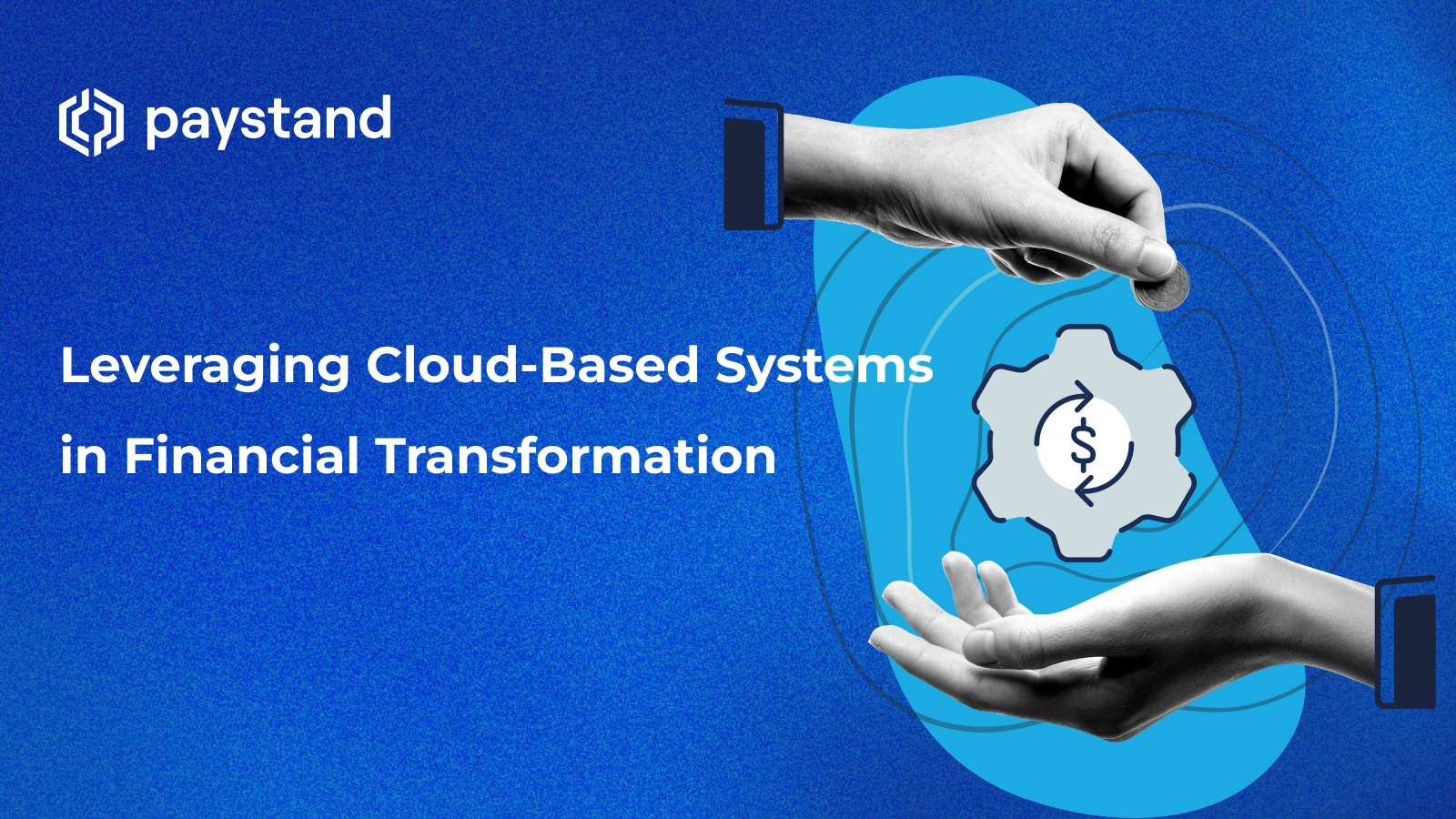Leveraging Cloud-Based Systems in Financial Transformation

Table of Contents
- Why cloud-based financial systems are redefining finance
- SaaS in finance: adapting to industry needs
- Cloud adoption as a competitive advantage
- Cloud technology implementation challenges
- How Paystand can support your cloud transformation journey
Key Takeaways
- Cloud-based financial systems drive a fundamental shift in finance, offering flexibility, efficiency, and resilience over traditional on-premise solutions.
- SaaS platforms in finance provide affordability, quick implementation, and automatic updates, allowing finance teams to reduce costs and increase agility.
- Cloud adoption enhances competitive advantage by cutting expenses and empowering finance teams to focus on strategic growth and proactive financial insights.
- Challenges in cloud implementation include security, integration, cost management, data privacy, and skills gaps, which can be mitigated through encryption, integration tools, usage monitoring, compliance measures, and training.
As financial institutions advance toward 2025, the momentum of digital transformation is undeniable. The shift from traditional, on-premise systems to cloud-based financial systems has become more than a technical change—a fundamental shift in the industry's strategic landscape. Cloud-based solutions set a new standard, empowering organizations to operate flexibly, efficiently, and resiliently.
Once considered merely a convenience, this trend has proven to be a critical tool in supporting financial leaders in making data-driven decisions, enhancing collaboration, and prioritizing security. With financial services relying on cloud platforms more than ever, it’s no surprise that nearly all North American financial services firms are along their cloud journey, marking a historic transformation in the industry.
Why Cloud-Based Financial Systems Are Redefining Finance
Adopting cloud-based financial systems offers a breadth of advantages that reshape financial operations. Cloud systems provide a seamless experience for stakeholders—from CFOs to clients—and set a strong foundation for leveraging new technologies like artificial intelligence, open banking, and automation. This ecosystem is designed to help organizations stay competitive, adapt to evolving market demands, and meet customers’ increasing expectations for security, speed, and transparency.
The following key benefits highlight why cloud-based solutions are becoming essential in finance:
- Real-time data access: Cloud technology empowers finance professionals to make data-driven decisions from anywhere with an internet connection, enhancing agility and responsiveness to market changes.
- Scalability: Cloud platforms scale with company growth, enabling flexible resource adjustment. Pay only for what you use, ensuring expansion readiness.
- Routine process automation: Cloud-based financial systems automate routine tasks, allowing finance staff to focus on strategic work. This reduces errors, speeds up processes, and improves the accuracy of financial forecasting and analysis data.
- Data security and compliance: Cloud-based financial solutions enhance security with encryption, backups, and compliance, mitigating breach risks. Businesses trust cloud storage for critical information.
SaaS in Finance: Adapting to Industry Needs
Software-as-a-service (SaaS) platforms have become one of the most popular models for cloud-based solutions in finance due to their affordability, ease of implementation, and automatic updates.
For finance teams, SaaS enables a more agile operating environment by lowering costs, minimizing downtime, and integrating seamlessly with existing systems. Recently, solutions like Payments-as-a-Service have further streamlined financial operations, allowing institutions to manage transactions more efficiently without substantial upfront investments.
Cloud Adoption as a Competitive Advantage
As finance teams adopt cloud-based solutions, they save on costs and transform their organizational roles. With lower overhead costs and the ability to offload many IT responsibilities, finance teams can reinvest their resources and focus on strategic growth. Companies adopting cloud systems typically see an approximate 30% reduction in overall expenses, a shift that contributes to their competitive advantage and positions them for long-term success.
In terms of functionality, cloud-based systems also provide advanced capabilities like real-time reporting and analytics, allowing finance teams to move beyond reactive reporting to proactive financial insights. This shift is crucial for financial leaders who aim to make informed decisions in an increasingly data-driven industry. As we look forward to 2025, finance teams equipped with cloud technology will be poised to offer strategic insights and drive organizational value.
Cloud Technology Implementation Challenges
Despite the advantages, transitioning to cloud-based systems does come with challenges. When implementing a cloud system, financial leaders must consider security, integration, and cost management. Here are some common challenges and effective solutions for a successful transition:
- Security Concerns: Protecting sensitive data remains a top priority. Cloud providers address this with encryption, access control, and 24/7 monitoring.
- Integration with Existing Systems: APIs and other integration tools can connect cloud systems with on-premises applications, ensuring seamless data flow.
- Cost Management: Cloud systems operate on a pay-as-you-go model. Monitoring cloud usage and employing cost-saving features like reserved instances can help control expenses.
- Data Privacy: Regulatory compliance and privacy measures, such as anonymization and pseudonymization, safeguard sensitive information.
- Skills Gap: Finance teams must be upskilled to manage new cloud-based tools effectively. Investing in ongoing training can bridge this skills gap.
How Paystand Can Support Your Cloud Transformation Journey
At Paystand, we understand that cloud-based systems are essential for a future-ready finance operation. Our platform integrates seamlessly with various financial systems, providing scalability, enhanced security, and automation. Whether you’re looking to improve operational efficiency, support remote work, or gain real-time insights, Paystand’s cloud solutions offer a complete suite of tools that finance teams need to thrive in 2025 and beyond.
Cloud-based systems are redefining the financial landscape by offering a flexible, secure, and scalable approach to economic management. This evolution goes beyond operational improvements; it empowers organizations to embrace innovation, enhance collaboration, and drive growth.
To learn more about how digital transformation will shape the future of finance, download our ebook, The Future of Finance in 2025. In it, we explore how digital advancements empower financial teams, enhance customer satisfaction, and redefine service expectations. Download your copy today!




